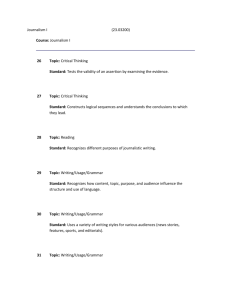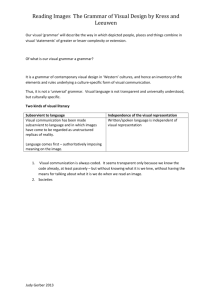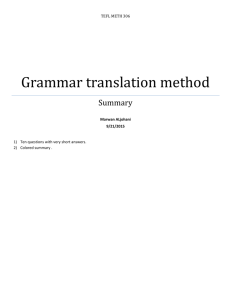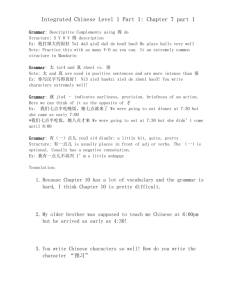Grammar B
advertisement
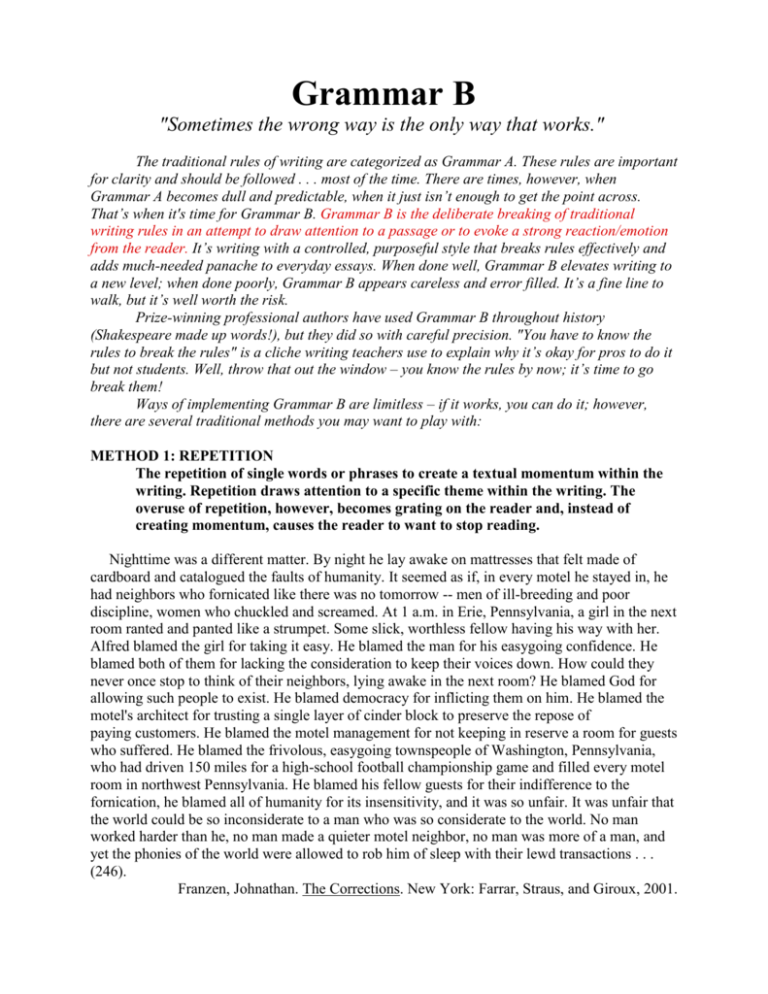
Grammar B "Sometimes the wrong way is the only way that works." The traditional rules of writing are categorized as Grammar A. These rules are important for clarity and should be followed . . . most of the time. There are times, however, when Grammar A becomes dull and predictable, when it just isn’t enough to get the point across. That’s when it's time for Grammar B. Grammar B is the deliberate breaking of traditional writing rules in an attempt to draw attention to a passage or to evoke a strong reaction/emotion from the reader. It’s writing with a controlled, purposeful style that breaks rules effectively and adds much-needed panache to everyday essays. When done well, Grammar B elevates writing to a new level; when done poorly, Grammar B appears careless and error filled. It’s a fine line to walk, but it’s well worth the risk. Prize-winning professional authors have used Grammar B throughout history (Shakespeare made up words!), but they did so with careful precision. "You have to know the rules to break the rules" is a cliche writing teachers use to explain why it’s okay for pros to do it but not students. Well, throw that out the window – you know the rules by now; it’s time to go break them! Ways of implementing Grammar B are limitless – if it works, you can do it; however, there are several traditional methods you may want to play with: METHOD 1: REPETITION The repetition of single words or phrases to create a textual momentum within the writing. Repetition draws attention to a specific theme within the writing. The overuse of repetition, however, becomes grating on the reader and, instead of creating momentum, causes the reader to want to stop reading. Nighttime was a different matter. By night he lay awake on mattresses that felt made of cardboard and catalogued the faults of humanity. It seemed as if, in every motel he stayed in, he had neighbors who fornicated like there was no tomorrow -- men of ill-breeding and poor discipline, women who chuckled and screamed. At 1 a.m. in Erie, Pennsylvania, a girl in the next room ranted and panted like a strumpet. Some slick, worthless fellow having his way with her. Alfred blamed the girl for taking it easy. He blamed the man for his easygoing confidence. He blamed both of them for lacking the consideration to keep their voices down. How could they never once stop to think of their neighbors, lying awake in the next room? He blamed God for allowing such people to exist. He blamed democracy for inflicting them on him. He blamed the motel's architect for trusting a single layer of cinder block to preserve the repose of paying customers. He blamed the motel management for not keeping in reserve a room for guests who suffered. He blamed the frivolous, easygoing townspeople of Washington, Pennsylvania, who had driven 150 miles for a high-school football championship game and filled every motel room in northwest Pennsylvania. He blamed his fellow guests for their indifference to the fornication, he blamed all of humanity for its insensitivity, and it was so unfair. It was unfair that the world could be so inconsiderate to a man who was so considerate to the world. No man worked harder than he, no man made a quieter motel neighbor, no man was more of a man, and yet the phonies of the world were allowed to rob him of sleep with their lewd transactions . . . (246). Franzen, Johnathan. The Corrections. New York: Farrar, Straus, and Giroux, 2001. METHOD 2: SENTENCE FRAGMENTS The deliberate fragmenting of sentences to draw emphasis toward ideas by isolating them within a paragraph. Purposeful fragmenting is different from accidental fragmenting -- there must be a reason for the structure. Summer. Bright hot days. Hunger still a vital part of my consciousness. Passing relatives in the hallways of the crowded home and not speaking. Eating in silence at a table where prayers are said. My mother recovering slowly, but now definitely crippled for life. Will I be able to enter school in September? Loneliness. Reading. Job hunting. Vague hopes of going north. But what would become of my mother if I left her in this queer house? And how would I fare in a strange city? Doubt. Fear. My friends are buying long-pants suits that cost from seventeen to twenty dollars, a sum as huge to me as the Alps! This was my reality in 1924 (179). Wright, Richard. Black Boy. New York: Perennial Classics, 1944. METHOD 3: THE LABYRINTHINE SENTENCE A finely crafted collection of words that weaves in and out, adding information, riding rhythms of parallel sentence structure, while tacking on phrases and clauses to form a flowing sentence. The labyrinthine sentence is different from a run-on because it adds information constantly -- it's one lengthened idea, not several ideas strung together. Teddy felt her in him, pressed at the base of his throat. He could see her sitting in the early July haze, in that dark orange light a city gets on summer nights just after sundown, looking up as he pulled to the curb and the kids returned to their stickball game in the middle of the street, and the laundry flapped overhead, and she watched him approach with her chin propped on the heel of her hand and the cigarette held up by her ear, and he'd brought flowers for once, and she was so simply his love, his girl, watching him approach as if she were memorizing him and his walk and those flowers and this moment, and he wanted to ask her what sound a heart made when it broke from pleasure, when just the sight of someone filled you the way food, blood, and air never could, when you felt as if you'd been born for only one moment, and this, for whatever reason, was it (48). Lehane, Dennis. Shutter Island. New York: Harper Collins, 2003. We don’t laugh much, there is no more bread and we’re hungry, the four of us. I put on my shoes and run through the streets of Limerick to keep myself warm against the February frost. You can look in people’s windows and see how cozy it is in their kitchens with fires glowing or ranges black and hot, everything bright in the electric light, cups and saucers on the tables with plates of sliced bread, pounds of butter, jars of jam, smells of fried eggs and rashers coming through the windows enough to make the water run in your mouth, and families sitting there digging in all smiling, the mother crisp and clean in her apron, everyone washed, and the Sacred Heart of Jesus looking down on them from the wall, suffering and sad but still happy with all that food and light and good Catholics at their breakfast (63). McCourt, Frank. Angela’s Ashes. New York: Simon & Schuster, 1996. Print. METHOD 4: THE LIST A list is a textual series of items -- objects, characteristics, observations -- removed from formal sentence structure. Lists create a quick idea of something -- a place, person, situation -- by presenting specific details without offering interpretation of those details. By presenting raw content without commentary, lists force the reader to interpret and evaluate the significance of the content. "Homer," says Snowman, making his way through the dripping-wet vegetation. "The Divine Comedy. Greek statuary. Aqueducts. Paradise Lost. Mozart's music. Shakespeare, complete works. The Brontes. Tolstoy. The Pearl Mosque. Chartres Cathedral. Bach. Rembrandt. Verdi. Joyce. Penicillin. Keats. Turner. Heart transplants. Polio vaccine. Berlioz. Baudelaire. Bartok. Yeats. Woolf." There must be more. There were more. The sack of Troy, says a voice in his ear. The destruction of Carthage. The Vikings. The Crusades. Ghenghis Khan. Attila the Hun. The massacre of the Cathars. The witch burnings. The destruction of the Aztec. Ditto the Maya. Ditto the Inca. The Inquisition. Vlad the Impaler. The massacre of the Huguenots. Cromwell in Ireland. The French Revolution. The Napoleonic Wars. The Irish Famine. Slavery in the American South. King Leopold in the Congo. The Russian Revolution. Stalin. Hitler. Hiroshima. Mao. Pol Pot. Idi Amin. Sri Lanka. East Timor. Saddam Hussein. "Stop it," says Snowman. Sorry, honey: Only trying to help (79-80). Atwood, Margaret. Oryx and Crake. New York: Anchor Books, 2003. QUESTIONS TO ASK WHILE ATTEMPTING GRAMMAR B: o Am I breaking the rules with purpose? o Am I in complete control of this writing? o Are my attempts at Grammar B helping my writing, or am I overdoing it? o Can I explain why what I’ve done is better? o What is my intent in this writing? Are my readers grasping that intent?



